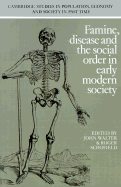Book contents
- Frontmatter
- Contents
- List of contributors
- List of figures
- List of tables
- Andrew Appleby: A personal appreciation
- A bibliography of Andrew B. Appleby's principal works in chronological order
- List of abbreviations
- 1 Famine, disease and crisis mortality in early modern society
- 2 The social economy of dearth in early modern England
- 3 Death in Whickham
- 4 The response to plague in early modern England: public policies and their consequences
- 5 Demographic crises and subsistence crises in France, 1650-1725
- 6 Markets and mortality in France, 1600–1789
- 7 Some reflections on corn yields and prices in pre-industrial economies
- 8 Family structure, demographic behaviour, and economic growth
- Consolidated bibliography
- Index
- Cambridge Studies in Population, Economy and Society in Past Time
1 - Famine, disease and crisis mortality in early modern society
Published online by Cambridge University Press: 01 June 2011
- Frontmatter
- Contents
- List of contributors
- List of figures
- List of tables
- Andrew Appleby: A personal appreciation
- A bibliography of Andrew B. Appleby's principal works in chronological order
- List of abbreviations
- 1 Famine, disease and crisis mortality in early modern society
- 2 The social economy of dearth in early modern England
- 3 Death in Whickham
- 4 The response to plague in early modern England: public policies and their consequences
- 5 Demographic crises and subsistence crises in France, 1650-1725
- 6 Markets and mortality in France, 1600–1789
- 7 Some reflections on corn yields and prices in pre-industrial economies
- 8 Family structure, demographic behaviour, and economic growth
- Consolidated bibliography
- Index
- Cambridge Studies in Population, Economy and Society in Past Time
Summary
In 1965, when Peter Laslett first asked the question, ‘Did the peasants really starve?’, historical demography in England was scarcely in a position to provide him with an answer. Paradoxically, despite the interest of earlier demographers, with Malthus one of the foremost, the study of what has come to be known as ‘crisis mortality’ was still in its infancy. Apart from a seminal article by Drake based on the parish registers of south-west Yorkshire, there were few studies to match the work of French historical demographers on which Laslett drew. As he made clear, our knowledge of the critical issue of the reality of the threat of famine was rudimentary. Such discussion as there was relied on the vivid impression of literary sources which, with their well-worn examples, carried a serious risk of exaggeration. In the face of this uncertain knowledge, Laslett's conclusion was that, ‘the relation between the amount and cost of food and the variations in the level of mortality, of men and women as well as children, must remain an open question for the time, along with that of whether crises of subsistence were a present possibility in the English town and countryside’.
Eighteen years later, when he repeated his earlier question in The World We Have Lost Further Explored, he noted, ‘Not one of these plaintive queries is as appropriate now in 1983’.
- Type
- Chapter
- Information
- Publisher: Cambridge University PressPrint publication year: 1989
- 10
- Cited by



